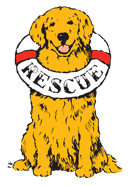Last fall, veterinarians in our geographic area, including PA, NJ, and NY, saw a noticeable increase in the number of Leptospirosis cases they treated. Symptoms include fatigue, fever, vomiting/loss of appetite, increased thirst, and excessive bleeding/bruising. The disease can lead to kidney/liver failure. In humans, it causes flu-like symptoms and can also result in liver or kidney failure.
Treatment regimen includes antibiotics and supportive care. When treated early and aggressively, prognosis is good. And yes, there is a vaccine available, so you should discuss the pros and cons of vaccinating your dog against Leptospirosis with your veterinarian. DVGRR requires all dogs that board at Golden Gateway to have this vaccine. We’ve had this requirement in place for years to protect our rescue dogs, boarders, staff, and volunteers.
Canine Flu
Another disease for which you should consider vaccination is canine flu. Two strains (H3N8 and H3N2) have been identified in the U.S. It is highly contagious, with H3N8 first identified in Florida in 2004 and H3N2 (originally thought to be limited to Asia) identified in the Chicago area in 2015 and diagnosed in Florida, Georgia, North Carolina, South Carolina, Texas, Kentucky, Missouri, Louisiana, and Illinois by 2017.
Unlike Leptospirosis, there is no evidence that canine flu is zoonotic; however, it can easily be transmitted between dogs at common places like kennels, groomers, day care facilities, dog parks, etc. In addition to dog-to-dog contact, it can also be spread indirectly (e.g., shared toys, food/water bowls, leashes). Additionally, human hands and contact can spread the disease from one dog to another. The virus can remain on surfaces for up to 48 hours, on clothing for up to 24 hours, and on hand for 12 hours. According to AVMA®, “Virtually all dogs exposed to canine influenza become infected, with approximately 80% developing clinical signs of the disease. The approximately 20% of infected dogs that do not exhibit clinical signs of the disease can still shed the virus and spread the infection.”
It is a respiratory disease, the symptoms of which include nasal discharge and coughing, with a persistent cough the most common sign. Lethargy and fever may also be symptoms, and dogs most severely affected show signs similar to pneumonia (high fever and increased respiratory rate and effort). As it is viral, supportive care is the best course of treatment along with nonsteroidal anti-inflammatories to reduce fever and plenty of fluids to maintain hydration.
As with Leptospirosis, vaccines are available for both H3N8 and H3N2 canine influenza, with one available for protection against both strains. Similarly, DVGRR requires any dog that boards at Golden Gateway to be vaccinated against canine flu.
We strongly encourage you to discuss both of these vaccinations with your own veterinarian to determine if they are appropriate for your dog.
(Reprinted from Golden Opportunities, V-26, Issue 1, 2019)






